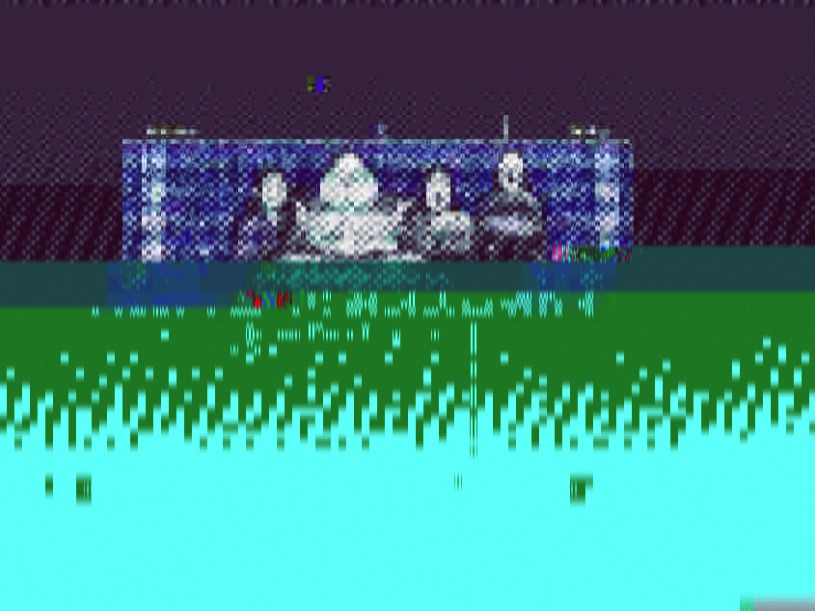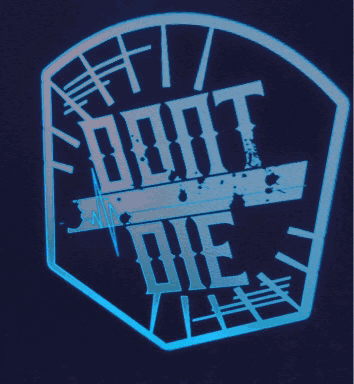- Jim
I'm Jim Crawford. I am thirtysomething -- 36, I think. And I live in Oakland.
I make games. People seem to care about them. I don't know if people come to me for my opinions.
- David
You don't know if they do?
- Jim
No, they do come to me for my opinions. [Laughs.] And I'll offer them, but they're listening; I'm not telling them to listen.
- David
[Laughs.] I know you just gave a talk at NYU. Do you feel dubious that there is wisdom other people can impart to others in this space?
- Jim
I'm proud of my talk. I just don't feel like I'm the one to judge whether I'm qualified.
- David
Well, how about say something to give people context for this who maybe don't know a lot about videogames. You know, what have you done, so people get who you are and where you're coming from.
- Jim
I've been making games for a long time, as a hobby. I had a brief dip into the industry in 2005 which turned out to be a disaster. After that, I assumed I would be making games as a hobby for my whole life, but one of my hobby games kind of blew up and I decided now that I have this reputation, maybe I can take that and turn it into making games on my own terms. I haven't had a day job in three years, so it’s going okay.
- David
Congratulations.
So, for people are not familiar, the hobby game that hit it big would be --
- Jim
Frog Fractions. Yeah.
- David
How can you wrap people's minds around what that game is who may not be familiar without also spoiling it?
- Jim
This is basically one big spoiler: Frog Fractions is a game that appears to be one thing and turns out to be another. It's that subversion that makes people want to share it with their friends, so that’s how it got the reputation it did.
- David
And then I know you had a successful Kickstarter for its sequel, which you said you would not be announcing when it is out. It will just make its way out.
- Jim
Yes. I won't tell anybody where it is or what it's called. The idea is that someday they’ll just find it. It's completely ridiculous that I got away with that on a Kickstarter.
- David
I would agree, but I think you set the scene for you and only you to be able to do that.
- Jim
Yeah. It was the only way to do that project.
- David
So, all I will ask is: Is it out now? Yes or no?
- Jim
I don't think I should answer that.
- David
[Laughs.] I would agree.
So, let's talk about these other things from your emails you did want to talk about. One of them you mentioned was this phenomenon you'd like to see go away of "in games and in every artistic medium, the attitude is that we need less bad art or things they dislike, when in fact what people they want is more good art or more things they do like."
- Jim
I think that presuming good filtering, which is something that we're still as a culture working on, then you can just ignore bad art and it doesn't have to be part of your life at all. And if a million people like a thing that you don't like, then that doesn't really harm you in any way.
If somebody's out there making art that you find personally really bad, even if nobody anywhere likes it, that's still fine. I've made plenty of bad art in my life. There's nothing wrong with it. It's just the attitude that -- I think where it comes from is people want to appear tasteful to their friends, so the way they do that is by critiquing things they find offensive that they think their friends will find offensive. And if that's your goal, I guess I don't have anything to say to that other than you're kind of missing the point of art.
- David
Which in your view would be? Sorry, I know that's very broad.
- Jim
Oh man. You put me on the spot there.
- David
Well, maybe to put you less on the spot, maybe it's a fairer assertion that it's not necessarily stuff that needs to be evaluated or needs to be put into that binary of "good" or “bad.”
- Jim
I think the purpose of art is to make your life better, right?
And you don't make your life better by yelling at things you don't like.
- David
[Laughs.] I would agree with that.
- Jim
You surround yourself with things you do like.
- David
Do you feel there's an excess of that? People yelling about things they don't like?
- Jim
Yeah. It's easy and it's fun and it makes you sound smart. And so I absolutely get it. I remember going through that period in my life where I was constantly throwing out those opinions -- actually, it coincided with the period where I was mostly making bad art.
- David
How do you think that works? Was there any correlation?
- Jim
I think it was a coincidence. I think it was a coincidence that at the same time I was making bad art I was critiquing bad art. I think it was that I hadn't matured as much. I was still a work in progress in both respects.
- David
Do you feel like there's an abundance or it's more prevalent in games circles than in other mediums?
- Jim
I think it's really common in music too, but just in general, if you got to any pop-culture subreddit, for example, you're going to see a lot of people complaining about things they don't like, things the general public likes, and "aren't we better than them?"
But it is very common in games, specifically because games are, by their nature, exclusive. It's fundamental to the nature of games to exclude. The medium is about seeing who's better than who. Or, are you good enough to beat this challenge? And so it's fundamental to the whole endeavor that you're measuring and you're comparing.
- David
Do you think games are starting to break away from that?
- Jim
I'm seeing movement in that direction.
So, you see people critiquing games like Gone Home, doing things like tagging it as a "walking simulator" on Steam. This is the game community saying -- not that this thing is bad art, but that it's not a game, which is in a way even more exclusionary. "It's not a bad game, it's not even a game at all."

But you also see the same crowd playing games like Slender, which is by the same definition, not a game. It's an experience-delivery system where the experience is being very scared, and for whatever reason that crowd is willing to accept that as a worthwhile endeavor. I do think that if we ever get to the point where storytelling in games becomes a mature thing that exists in the large, it's going to be via horror games.
- David
Interesting. I've never thought of it that way. What makes you think that?
- Jim
Just that it’s the closest thing we have that’s anywhere close to mainstream. There’s a market for horror games that isn’t there right now for any other game that doesn’t have traditional gameplay.
Also, VR. Horror games are thoroughly suited to VR in a way no other genre is other than maybe porn. So I think we’re going to see horror becoming more popular in the next few years as VR takes off.
- David
Regardless of horror or however changes come about, I do feel like often we get caught up on labels and boundaries almost to the point of distraction. So I'm not at all trying to get you to talk about the games that you're working on --
- Jim
[Laughs.]
- David
I'm really not. But I'm curious: In the games space what do you perceive as typically being defined as "good games" and "bad games?"
- Jim
Oh, it varies so much from game to game. It depends on what the game is going for and even what my mood is at the time. A purely mechanics-driven game like Geometry Wars, I'm going to judge based on how well it delivers on its play mechanics, and a game like Gone Home is much more about storytelling and it's got completely different goals and completely different criteria for whether it's good or bad.
- David
You were talking about horror games before, and something that I often get asked by developers from the perspective of a reviewer is: If you're someone who makes a horror game, you will be confused why they would have a person review it who has also reviewed sports games.
Like, something that confuses me is that really something that the audience for games does? That they stick to their one thing and they just play that?
Aren't we all omnivores in games?
- Jim
It's harder for games than it is for most media because you as a player you have your expertises. If you don't play sports games, it's going to be pretty hard to be able to review one because there's such a long learning curve to get into any new genre. And so I think of myself of an omnivore but I actually probably have a fairly limited palette of game genres that I pay attention to. That's kind of inevitable. It’s impossible to play every game.
Whereas, for comparison, it's much more reasonable to see every movie that comes into the theater. Most of them are accessible to the general public because there isn't that barrier to entry.
- David
So how can even gauge whether more "good" stuff is coming in with games? Do you feel like the current landscape does a good enough job of flagging down and shining a spotlight and making a big deal?
- Jim
This is what I was getting at when I was saying we need to work on our filtering system. The ideal would be that if you make a good game, that’s the end of the process, and people just come to play it. But that's not how it works at all. There's a lot of PR involved. You can go deep into conspiracy theories about that, but it’s how every market works.
It sucks, but you need to figure out how to work the market. If you know people, that's going to help a lot. If you have money, that's going to help a lot.
- David
Do you have an example of a game that you thought was flagged as "bad" that you thought was actually "good?"
- Jim
I don't know if this is really germane to the discussion, but I always thought Deus Ex: Invisible War got a bad rap. Deus Ex kind of immediately became part of the pantheon and was instantly beloved, despite having a lot of very obvious problems.
Trying to follow up on that sort of thing is just impossible, which is why Portal 2, despite being amazing, was still considered disappointing. Invisible War was not amazing, it was just good, and in the context of following up a game that was part of the pantheon, that means bad.

There was a lot of discussion at the time about surface-level problems, like, they had a console-oriented interface because it was the developer's first Xbox game. They had an early shadowing engine and normal-mapping system that they didn't quite know how to use. So everything looks really shiny and ugly. The physics system was just kinda jammed in there at the last minute, so they didn't really make good use of it, and it wasn’t well-tuned so the object motion was kind of jittery. A lot of surface-level problems like that.
But what people liked about Deus Ex wasn’t the quality of implementation, because the quality of implementation wasn’t so great in the first game either. They liked the storytelling. And the storytelling still delivers in Invisible War. Still really good world-building, and really good conversations.
- David
I mean, I wonder -- we talk about filtering. But it's very rare you will read a negative preview of a game.
- Jim
Right.
- David
By definition you're seeing a cherry-picked selection of a game. You understand that it's early, and I think you sort of give the benefit of the doubt that, like, "Well, things look problematic, but I'm sure by the day blah blah blah, all this stuff will be fixed."
I wonder if what happened was there was an outlash or a reaction -- I'm even seeing some of this right now. Like, I don't know if Witcher 3 has been on your radar, but there has been some talk from some corners about how it doesn't look as amazing in the end as it was indicated to a few years ago -- even though objectively it still looks amazing.
Do you think there might be something missing in the ramp-up to games to help better temper people's expectations on what they'll be getting?
- Jim
I don't know how you solve the problem of gamer expectations. I think it's been accidentally cultivated by the AAA marketing engine over the past 30 years, and now everybody has to sleep in the bed they've made.
- David
I think you've done a good job for yourself in finding an escape hatch.
- Jim
Kind of. It only works until people find Frog Fractions 2, though, then there will probably be lots of disappointment to go around.
- David
I just wonder where this mentality comes from and what perpetuates it. Is it something that gets ingrained in people as they grow up with games? is it because games are an interactive medium and somehow it slips into people's subconscious?
- Jim
I think a lot of it is the press having treated games as consumer products for decades, trying to rate each game objectively like it was a household appliance.
- David
Which is why it seems especially funny to me when people think they can do things like compare NBA Jam to Resident Evil.
- Jim
Right. Even if you're not directly comparing them, you're putting them on the same scale.
- David
And you can't.
- Jim
Right. And I think a lot of it is just because of that expectation that this is what journalism is for, people getting into the mindset that there is a "right" way to feel about a game.
- David
And I think the "right" feeling is yet another binary where you have to either totally hate it or you totally love it.
- Jim
Yeah.
- David
So, I don't know. I just wonder: How do we inject more nuance into the dialog around games?
- Jim
I think the problem is that the people who feel nuanced about it don't say anything, or their voices just aren't as heard because they aren't shouting as loudly. If you don't feel very strongly about an issue either way, you're probably not going to be posting an angry rant on a message board.
There’s an idea that human intuition comes from statistical observation. Before there were newspapers, you would gauge the likelihood of being eaten by a shark by the number of people you had seen being eaten by sharks, versus the number of times you'd seen people not eaten by sharks. Nowadays you read in the newspaper that five people have been eaten by sharks this year, to your intuition, that’s the same as having five people you know eaten by sharks this year. And you haven’t been to the beach at all.
And so, the exposure to all these happenings -- these exceptional happenings, because if they weren't exceptional, they wouldn't be in the newspaper -- really skews your perception of how the world is. One solution that I've heard proposed is to correct your intuition by actually surrounding yourself with the right proportions. For every shark attack you hear about, you look at the actual proportion, the number of people who swim in the ocean and number of people who are eaten by sharks, and you go observe that many people swimming and not being eaten by a shark. And then your intuition will be correct.
And of course, that's completely impractical for something like shark attacks where your intuition is so drastically skewed by reported incidents.
- David
It's a properly absurd example, because I oftentimes feel like in games whenever you talk about something lacking in games, people will point to the three people that have been eaten by sharks.
- Jim
Yeah.
- David
Funny enough, I was scrolling around on Twitter this morning and found a Wired thing about "sexuality in games" saying there's a lot of it, when in fact they do that common thing of just naming three or four. When I know, just last week you emailed me that the thing you wanted to talk about was the specific lack of this.
- Jim
Yeah. And the examples that I brought up when I wrote you that email were the exact examples they came up with in that article, because they're the only ones that exist.
- David
Exactly. So you saw that article and you know what I'm talking about?
- Jim
Yeah.
- David
This topic has come up increasingly in my inbox. It seems like a fair amount of people want to make them. So why aren't we seeing more of it, then?
- Jim
I think we don't know how to sell it.
- David
We don't know how to sell sex?
- Jim
[Laughs.] Exactly, yeah. It doesn't sell itself, you know?
- David
I don't think we know how to do sex properly in videogames. As it were.
- Jim
I think it’s the perception of games as being for children. I think it's probably also people being ashamed of how sexualized games already are and wanting to step away from that. Notably, How Do You Do It? is actually on Steam. Before that happened, I wouldn’t have expected a game that seriously addresses sexual issues to go on Steam. The reason it did is that Steam just automatically gives slots to all the IGF nominees. That's just a thing they've done forever.

But I don't think they sell AO-rated games. It's very hard to address sex, except in a very abstract way, without being AO. Or unrated, I guess. I suspect it's gonna be another couple of decades before American culture is ready to accept the idea of video games that actually address these issues. That games aren’t just light entertainment for children.
Part of my barometer here is that the iOS App Store still does not allow those themes. Just flat-out can't put anything on there. You can have books about it, you can have songs about it, you can have movies about it, and that's exactly what they tell you if you bring it up. "If you want to address sexual themes, write a book."
- David
I always tracked this back to Nintendo when they were trying to bring the market back, an ironic over-correction for what games were before -- more or less for everyone, but also for adults. Obviously Custer's Revenge was not the best treatment of this subject material, but it at least is an instance of people were exploring that mindspace in the same real estate, like, how many decades ago?
- Jim
I think it was like, 1982.
- David
Do you think we're doing better today than we were then with this sort of stuff?
- Jim
My perception is that we're doing better, but part of that is the people I follow on Twitter like interesting games and talk about interesting games. So, I actually have very little idea how we're doing in the mainstream.
- David
What's the closest you've come, or a few, anyway, that you think have done this subject material in the way you'd like to see more of or are curious about?
- Jim
My favorite game along these lines is How Do You Do It? I was really impressed with it at IndieCade last year. It takes an interesting topic that you never ever see addressed in pop culture, a little girl playing with Barbie dolls, trying to figure out what sex is. I’m pretty sure it’s autobiographical.
It kind of makes a metaphor of the awkward interface, like QWOP, where you're just jamming buttons and seeing what happens. "Maybe it works like this?" That's kind of where your mind is at that age, you're just feeling through the whole issue without having any idea of what you're doing. I think that game does a really good job of just painting that picture.
- David
And afterwards it gives you a score of some sort.
- Jim
I think it's just counting the number of impacts that the physics engine registered.
- David
From those two zones.
- Jim
Yeah.
- David
This will all sound silly out of context, but I think that is something that is kind of missing from games that tackle more "mature" themes, is just being comfortable with being a little silly. I feel a lot of stuff that thinks it's being "mature" is silly by showing how serious it is trying to be.
- Jim
I agree with that. I think that's something we've been struggling with for a while. I was talking to a friend who used to be a philosophy professor. He was saying that philosophers have this reputation of idleness, just sitting and thinking all day and not really doing any real work. As a result, they feel the need to deliberately avoid any of life's pleasures, to distance themselves from that stereotype. Which is a perverse way to live your life.
And, yeah, I think gamers who are in their thirties now grew up in an era when gaming was really stigmatized, and they're acting like it still is. For the most part that stuff -- the politicians trying to ban violent video games -- has died down. Gamers are still trying to prove that games are art, to an audience that they apparently care about the opinions of, though I don't know who that audience is. Probably Roger Ebert? Unfortunately, he's dead now.
- David
And what a lot of those people don't realize is that Roger Ebert also reviewed at least one videogame.
- Jim
And he liked it. I would be very curious to ask art-denier Roger Ebert what he thinks of Cosmology of Kyoto, thinking back on it.

I played it for a few hours recently, and it seems like exactly the sort of game that he would like. It’s an adventure game, set in feudal Japan, but it doesn't really, that I noticed, have puzzles. You're just walking around a town, looking at things and talking to people. You're just immersed in that experience. A constant stream of interesting things. I never finished it, but when you're playing it, it just feels like it can go on forever. And that's lent a little bit of credibility from the fact that the art is so low-res, yet the game is on a CD-ROM. So you really could effectively have put an infinite amount of this art on the CD.
- David
It's interesting that you say that and earlier we were talking about Gone Home. I remember that review Roger Ebert wrote, and I don't remember seeing the words, "walking simulator."
- Jim
[Laughs.]
- David
And yet what I'm hearing you describe sounds awfully similar to a lot of games I'm hearing described in that way.
- Jim
Yeah.
- David
I also don't remember Roger Ebert slamming the game. I know he's written a lot of very negative reviews, he's gotten compilations of them as books. I do feel like I see that sort of thing much more from writers in the game space, where they are looking to not like something.
- Jim
I feel like Ebert had no idea. He had no context for what games were. Genres were a lot less defined in 1993 and the whole game culture at the time was more innocent, but Ebert especially had no idea. He was just approaching it as, "Here's something to play with. Here's a toy. I'm going to mess around with it and talk about my experience."
Which I think is a much more healthy way to approach any piece of art than, "Out of 10, how good are the graphics?"

